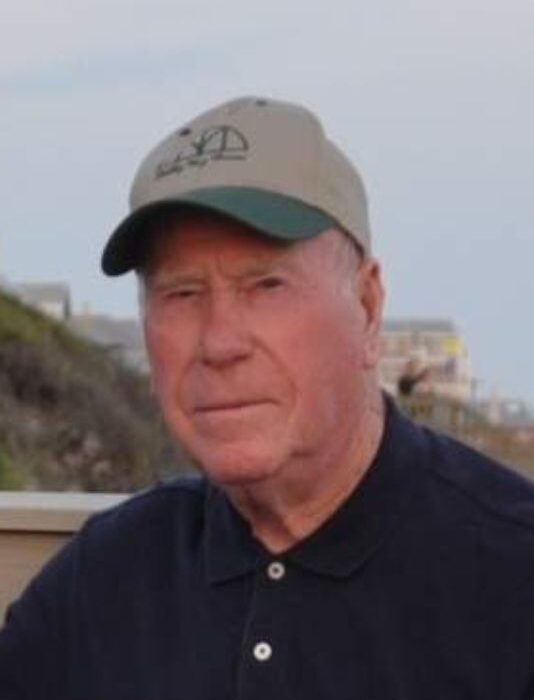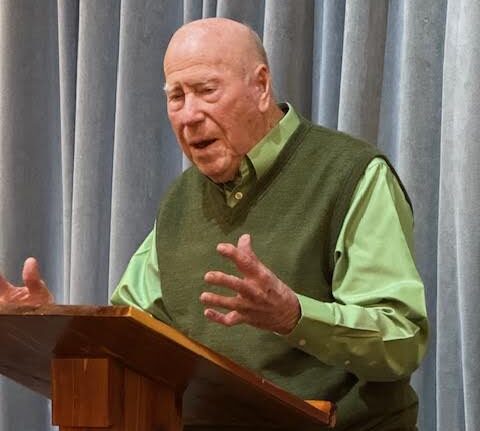Charles Robert Jones was born in a tenant house on his grandfather’s farm in Gainesboro, TN on June 21, 1930. When Roosevelt was elected President in 1932, and in March 1933 – four months after the election, at the lowest point of the American economy in national history – the Jones family relocated to Nashville, TN.
A product of the Great Depression, Charles’s early years were spent in a rental house in north Nashville. In 1936, his family moved to Old Jefferson, where they remained until the beginning of World War II in 1941. Later in his life, Charles became a familiar voice to local radio listeners, joining me on my radio show “Conversations with Mike Sparks” heard on WGNS in Murfreesboro every Sunday night from 5-6 pm.
The experiences of growing up in the country profoundly shaped Charles’s life. Fishing, hunting, and rural life nestled in the fork of Stones River on the edge of Old Jefferson left an indelible mark on his character. The local patrons who routinely gathered at the small General store shared stories that deeply impressed Charles and significantly influenced his worldview.
By 1942, World War II was well underway when the Jones family moved to Brunswick, Georgia. Charles found work at the JA Jones Shipyard, which was mass-producing ships on an unprecedented scale. In a unique role, he served as a messenger, delivering blueprints for the now-iconic Liberty ships that would play a crucial part in the war effort.
Charles Robert Jones: A Life of Innovation, Leadership, and Service
Charles Robert Jones built a remarkable life characterized by versatility, entrepreneurial spirit, and commitment to community. From humble beginnings to business success, his journey exemplifies resilience and vision.
Rep. Mike Sparks Honors Charles Robert Jones with Tn House Resolution
Early Years and Education
In 1946, the Jones family returned to Nashville where Charles attended East Nashville High School until leaving in the 10th grade. For three years, he worked at the Avco Corporation manufacturing steel aviation components and in construction.
Charles relocated to Detroit in 1949, working in an automobile plant for two years before joining the Army in 1951. During the Korean War, he served as a Medical Corpsman and later as a Psychiatric Assistant. While serving, he met and married Maryetta, to whom he wrote over 400 love letters during his two-year deployment.
Following the Korean War’s end in July 1953, Charles pursued higher education at David Lipscomb University in Nashville, earning a B.A. in History and Speech. He later completed a Master’s Degree in Speech Therapy and Psychology from Western Michigan University. During his college years, he preached at a small Church of Christ congregation and worked as a substitute teacher in Michigan.
## Business Career and Entrepreneurship
In 1965, Charles temporarily left public education to manage an automobile leasing company. His natural leadership abilities and motivational skills led to exceptional success, prompting him to permanently transition to business. His personable nature and wise counsel earned him valuable relationships and contacts that often followed him through various ventures.
His leadership experience with the Michigan Education Association and success in automobile leasing led to an opportunity developing a member benefit program for 80,000 MEA members. This achievement resulted in an invitation to Washington D.C. to create a similar program for over one million National Education Association members.
Leveraging his entrepreneurial vision, marketing talent, and business acumen, Charles negotiated advantageous deals with financial institutions, insurance companies, and manufacturers to secure discounts for teachers nationwide.
Building on this success, he founded Professional Economic Services in 1970, which he led until 1985. His impressive client roster included Delta Airlines, General Electric, the Retired Army Officers Association, and various military organizations.
## Real Estate Development and Historic Preservation
In 1985, Charles transitioned to real estate, investing in farms and commercial properties across Virginia, Texas, and Oklahoma. Returning to Tennessee in 1990, he focused on purchasing and preserving historic properties including the St. Bernard’s Convent Building and the Werthan Bag Factory.
His vision for repurposing historic buildings continued with the renovation of the former Macy’s Building, which he later traded for the Memorial Hospital property at Due West Towers. Charles also played a significant role in restoring the Historic Milky Way Farm, once owned by Mars Candies founder Franklin C. Mars.
## Legacy of Mentorship and Humanitarianism
While Charles excelled as an innovator, entrepreneur, developer, manager, and educator over six decades, these professional accomplishments represent only one dimension of his life. To family, friends, and community members, his greatest impact has been as a mentor and humanitarian who has counseled, inspired, and transformed countless lives through his kindness and good works.










Leave feedback about this